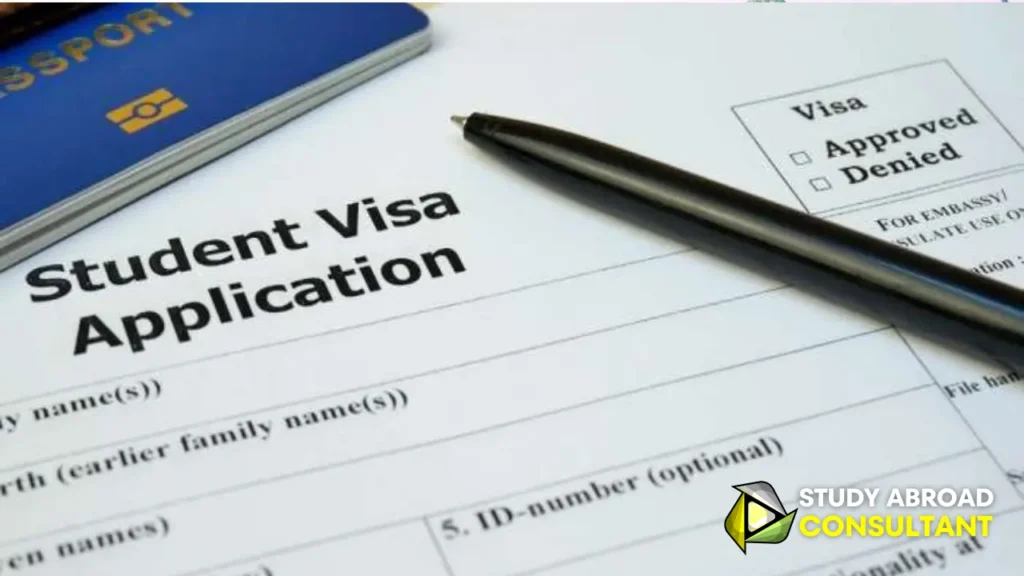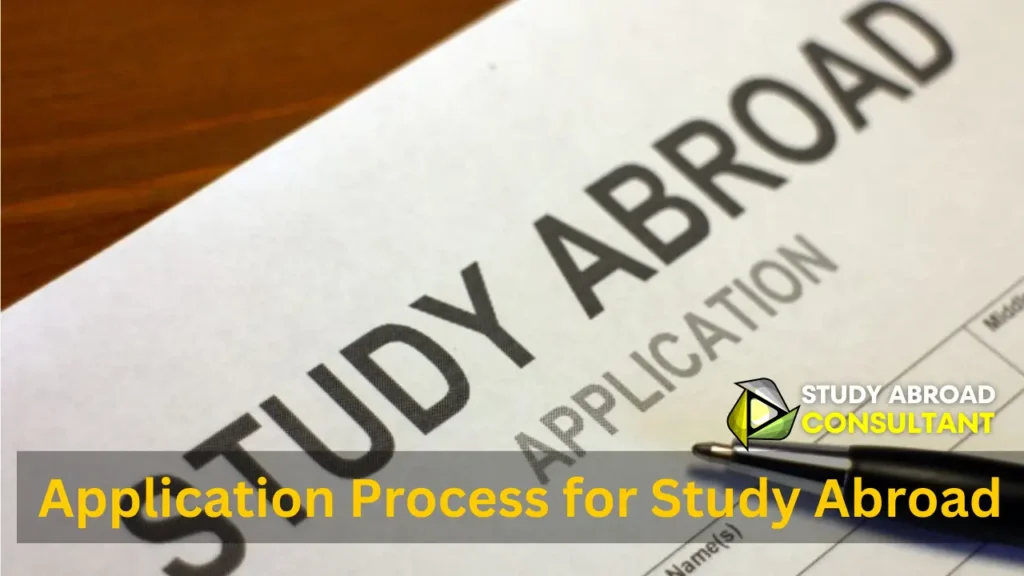Embarking on a journey to study abroad is a significant decision, one that promises to enrich your academic and personal life. The process, however, can be daunting. We have created this comprehensive guide to help you navigate the application process for study abroad. Whether you are aiming for a bachelor’s, master’s, or doctoral degree, understanding the steps involved will ensure a smoother transition to your dream educational destination.
University Application Process for Study Abroad
A counselor can make the process of applying to universities considerably simpler. A counselor serves as an assisting hand who is there for you at every turn. They will assist you with comprehending the prerequisites of each university and when to submit your application for study abroad from Pakistan.
Collectively, you will gather all the required paperwork, including recommendation letters and your grades, for submission. You can even get assistance from your counselor with developing a personal statement that highlights your goals and strong points.
They’ll see to it that everything is completed accurately and on schedule when it comes time to apply. In addition, they will get in touch with the University of your Choice to expedite the process and raise your chances of acceptance.
Offer Acceptance and Conditions
It’s an exciting moment when you receive an offer for the course of your choice, and your counselor is essential for guiding you through the acceptance process. Your counselor will assist you in going over the offer in detail and making sure you are aware of all the terms.
These prerequisites could be completing the necessary documents, reaching certain academic goals, or paying debts. Each condition will be explained by your counselor, who additionally offers advice and help on how to meet them.
At this point, it’s critical to be open and honest with your counselor so they can guide you through any worries and make sure the acceptance process goes well. You can confidently accept the offer and move forward with your academic career overseas after you’re at ease with the terms.
Understanding the Requirements
The first step in the study abroad application process is to understand the requirements of the universities and programs you are interested in. Each institution has specific criteria, so it’s crucial to:
- Research Thoroughly: Investigate the universities and courses that align with your academic interests and career goals. Look at their official websites and take note of the admission requirements, including academic qualifications, language proficiency tests, and application deadlines.
- Academic Records: Ensure your academic transcripts are up-to-date and meet the institution’s standards. Some universities may require specific grades or GPAs.
- Standardized Tests: Many institutions require scores from standardized tests such as the SAT, ACT, GRE, GMAT, or language proficiency exams like TOEFL and IELTS. Confirm which tests are necessary for your chosen program and schedule them well in advance.
- Letters of Recommendation: Gather letters from academic or professional references who can attest to your qualifications and suitability for the program.
- Personal Statement: Craft a compelling personal statement or essay that outlines your motivations, academic interests, and how the program aligns with your career aspirations.

Choosing the Right Program and University
Selecting the right program and university is pivotal. Consider the following factors:
- Academic Reputation: Look for institutions renowned for their programs in your field of interest.
- Location: Consider the geographical location and how it aligns with your personal preferences and career goals. Urban vs. rural settings, climate, and cultural environment can all impact your experience.
- Financial Considerations: Evaluate the cost of tuition and living expenses. Research scholarships, grants, and financial aid options available to international students.
- Campus Facilities: Investigate the facilities and resources available on campus, such as libraries, labs, student organizations, and support services for international students.
Preparing Your Application
Once you have shortlisted your preferred universities and programs, it’s time to prepare your application meticulously:
- Application Form: Fill out the application form carefully, ensuring all information is accurate and complete.
- Supporting Documents: Compile all necessary documents, including academic transcripts, standardized test scores, letters of recommendation, and your personal statement.
- Proof of Language Proficiency: If applicable, provide proof of your proficiency in the language of instruction through standardized test scores.
- Application Fee: Be prepared to pay any application fees required by the universities. Keep receipts or confirmations of payment.
- Submit Before Deadlines: Ensure you submit your application and all supporting documents before the specified deadlines. Late applications are often not considered.

Applying for a Student Visa
Once you receive an acceptance letter from your chosen institution, the next crucial step is applying for a student visa:
- Acceptance Confirmation: Accept the offer from the university and request your admission letter and other necessary documentation for the visa application.
- Financial Proof: Most countries require proof that you can financially support yourself during your stay. This may include bank statements, scholarship letters, or sponsorship affidavits.
- Medical Insurance: Obtain health insurance coverage as required by the host country.
- Visa Application Form: Complete the visa application form accurately. Some countries may require an in-person interview at their embassy or consulate.
- Biometrics and Documentation: Be prepared to submit biometrics (fingerprints and photograph) and all necessary documents, including your passport, admission letter, financial proof, and insurance.
- Attend Visa Interview: If required, attend the visa interview and answer questions confidently and honestly.
Preparing for Departure
With your student visa approved, it’s time to prepare for your departure:
- Travel Arrangements: Book your flight and plan your travel itinerary. Ensure you arrive before the orientation program if your university offers one.
- Accommodation: Arrange for accommodation, whether on-campus or off-campus. Confirm your living arrangements before departure.
- Packing Essentials: Pack appropriately for your new environment. Consider the climate, academic materials, personal items, and any legal documents you may need.
- Pre-Departure Orientation: Attend any pre-departure orientation sessions offered by your university or educational consultants. These sessions provide valuable information about adjusting to life in a new country.
Settling In
Upon arrival, there are several steps to help you settle into your new environment:
- Register with Local Authorities: Some countries require international students to register with local authorities upon arrival. Ensure you complete this step promptly.
- University Orientation: Participate in the university’s orientation program to familiarize yourself with the campus, academic system, and support services.
- Bank Account: Open a local bank account to manage your finances more efficiently.
- Get Involved: Engage in campus activities and student organizations to meet new people and immerse yourself in the local culture.
Conclusion
The application process for study abroad is a comprehensive journey that requires careful planning and preparation. By understanding the requirements, selecting the right program, preparing your application meticulously, securing a student visa, and preparing for departure, you can ensure a successful and enriching experience. The rewards of study abroad are immense, offering academic growth, cultural exchange, and the opportunity to develop a global perspective.
Also Read : Career Counselling
FAQs about the Application Process for Study Abroad
1. What are the basic requirements to apply for study abroad?
The basic requirements typically include:
- Completed application form
- Academic transcripts and certificates
- Standardized test scores (SAT, ACT, GRE, GMAT, TOEFL, IELTS, etc.)
- Letters of recommendation
- Personal statement or essay
- Proof of language proficiency
- Application fee
2. When should I start the application process?
It’s advisable to start the application process at least 12-18 months before your intended start date. This timeline allows you ample time to research programs, prepare for and take standardized tests, gather documents, and meet application deadlines.
3. How do I choose the right program and university?
Consider factors such as:
- Academic reputation and accreditation
- Course offerings and curriculum
- Location and cultural environment
- Tuition fees and living costs
- Availability of scholarships and financial aid
- Campus facilities and support services
4. What standardized tests might I need to take?
Common standardized tests include:
- Undergraduate Programs: SAT or ACT
- Graduate Programs: GRE or GMAT
- Language Proficiency: TOEFL, IELTS, or equivalent, depending on the language of instruction
5. How important are letters of recommendation?
Letters of recommendation are crucial as they provide insight into your academic and professional abilities from the perspective of mentors or employers. Strong letters can significantly enhance your application.
6. What should I include in my personal statement?
Your personal statement should cover:
- Your academic and career goals
- Why you chose the specific program and university
- Relevant experiences and achievements
- How the program aligns with your future aspirations
- Personal qualities that make you a suitable candidate
7. How do I apply for a student visa to Study Abroad?
To apply for a student visa to Study Abroad, you generally need:
- A valid passport
- An acceptance letter from the university
- Proof of financial support
- Health insurance documentation
- Completed visa application form
- Biometrics and possibly a visa interview
8. What financial aid options are available for international students?
Financial aid options may include:
- Scholarships and grants offered by universities, governments, or private organizations
- Student loans from banks or financial institutions
- Work-study programs available in some countries
9. How can I prepare for my departure to Study Abroad?
Preparation steps to Study Abroad include:
- Booking your flight and planning your travel itinerary
- Arranging accommodation
- Packing essential items and legal documents
- Attending pre-departure orientations
- Familiarizing yourself with the local culture and customs
10. What should I do upon arrival in the host country?
Upon arrival:
- Register with local authorities if required
- Attend the university’s orientation program
- Open a local bank account
- Get involved in campus activities and student organizations
- Familiarize yourself with the campus and local area
11. Can I work while study abroad?
Many countries allow international students to work part-time while study abroad, but the regulations vary. Check the specific work permit policies of your host country.
12. What are the benefits of study abroad?
Study abroad offers numerous benefits, including:
- Exposure to new cultures and perspectives
- Enhanced academic and professional opportunities
- Development of language skills
- Personal growth and independence
- Building a global network



